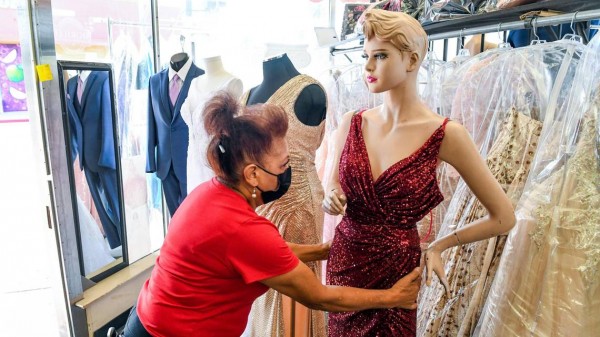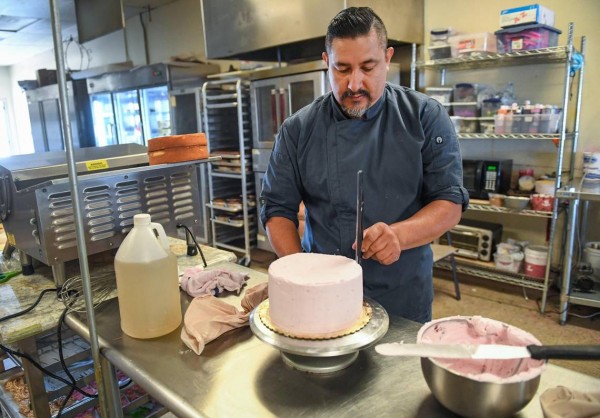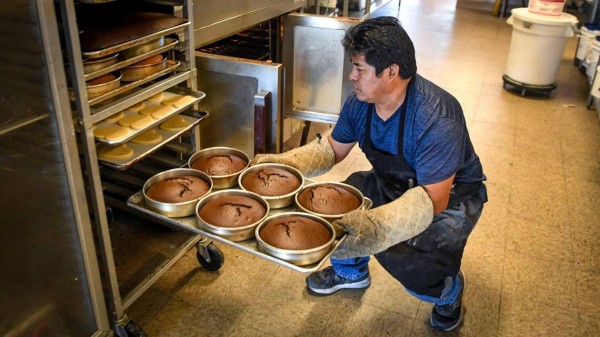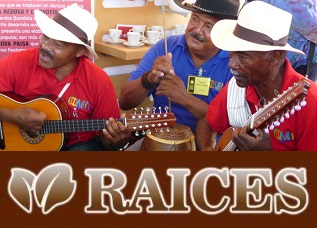
Amparo Cervantes, of Barr Brothers of California bridal shop in Fresno, adjusts a mannequin while working at the shop on Tuesday, April 20, 2021. CRAIG KOHLRUSS ckohlruss@fresnobee.com.
 This story is part of the Central Valley News Collaborative, which is supported by the Central Valley Community Foundation with technology and training support by Microsoft Corp.
This story is part of the Central Valley News Collaborative, which is supported by the Central Valley Community Foundation with technology and training support by Microsoft Corp.
By Nadia Lopez
The aroma of sweet burnt sugar and baking bread emanates from Callejas Cakes, a family-owned bakery in a quiet neighborhood in central Fresno.
Inside the shop, Mexican desserts like tres leches cakes — made from three types of milk — are displayed side by side with American classics, like a pink champagne cake topped with curls of chocolate and sequined with glazed strawberries. Shop owner Victor Callejas says the arrangment is intentional and blends his love of both cultures.
Callejas, a 47-year-old from Hidalgo, Mexico, said business at the bakery was booming pre-pandemic. As spring arrived in March 2020, eager customers demanded large cakes and desserts for festive occasions including baptisms, quinceañeras and weddings.
But overnight, as California went into a COVID-19 lockdown, Callejas’ business drastically changed. He went from booking orders for parties with up to 400 people to receiving an endless stream of calls postponing or canceling all events for the months ahead.
“Fortunately, I was able to stay open during the pandemic,” Callejas said in Spanish. “But it really affected us and our sales. We’re still recovering.”
For many Latinos, cultural celebrations such as baptisms, first communions, quinceañeras and weddings are not just festive events, but also mark important milestones in their lives.
For a predominantly Catholic group, these events are also a reflection of their faith. The celebratory rites of passage often involve large parties with hundreds of guests that can cost thousands of dollars.
But in the past year, local and statewide COVID-19 restrictions have forced Latinos to postpone or cancel these gatherings.
As a result, Latino entrepreneurs whose businesses depend on these vibrant celebrations have suffered considerable losses, some studies show. A report released last year by the Stanford Latino Entrepreneurship Initiative shows that 86% of the 3,500 Latino-owned businesses that were surveyed experienced a negative impact from COVID-19.
Now, a year into the pandemic, many Latino businesses have fought to remain open, relying on different sources of income, loyal clientele and personal savings to stay afloat, while others had to adapt by marketing new products, offering delivery services or ramping up their social media presence.
That response is integrated into Latino culture and mentality, said Marlene Orozco, a research analyst with the Stanford Latino Entrepreneurship Initiative. She said Latinos have had to be “very entrepreneurial as a survival skill.”
“Latinos do this all the time — selling what they have to make ends meet, or being creative about providing a new service or a new product,” she said. “I think this is by nature kind of the way that Latino businesses have operated before the pandemic and we’re seeing them adapt in those very similar ways now.”
With vaccination rates increasing and the number of COVID-19 cases declining across California, Callejas and other Latino business owners that cater to large-scale events are hopeful family festivities will resume. Yet some say they are also struggling on the path to recovery, as they grapple with the hardship the virus has caused within their community.
“We had to learn how to survive on our own by finding new opportunities or looking for other ways to sell our products,” Callejas said. “Today we’re doing a lot better. But we’ve had a lot of difficult moments.”
Without festivities, businesses pivoted to stay afloat
Fernando Flores took a massive financial hit last year when COVID-19 brought his catering and rental business, International Catering, to a grinding halt.
His business relies heavily on festivities centered around Latino celebrations. In addition to serving barbacoas and chile verde buffets at parties, he rents out chairs, tables, linens and dishes, while his wife provides decorations.
The 58-year-old Mexican American didn’t get any business loans or grants. Rather, he survived during the first few months of the shutdown by selling excess catering gear — including masks and gloves — as personal protective equipment. It was one of several strategies he employed to keep his business going while parties and other celebrations were put on hold, he said.
“I’ve been in business for over 20 years and this is by far the most devastation I’ve seen,” Flores said. “I liquidated a lot of my old inventory I’ve had for many years just to make ends meet.”
Flores said he had no other option but to pivot his business. He went from making upwards of $45,000 a month to “nothing, zero.”
“March, April, May, June, July, August — zero,” he said.

Victor Callejas, of Callejas Cakes in Fresno, frosts a cake at the shop on Tuesday, April 20, 2021. CRAIG KOHLRUSS ckohlruss@fresnobee.com.
Amparo Cervantes, who owns Barr Brothers, a bridal and quinceñeara shop in downtown Fresno, also said she had to get creative when events were canceled.
Cervantes, a Michoacán, Mexico native, runs her dress store on her own with the help of her daughter. Her mannequins are often decorated with shimmery dresses in eye-catching colors like crimson red, baby blue and bright fuchsia.
When the pandemic closed the shop’s doors, Cervantes beefed up the shop’s social media pages with promotions and specials, and offered to hold dresses for existing clients for a deposit or smaller, recurring payments. As an incentive for customers to keep buying her merchandise, she also gave free tiaras or bouquets with purchases, provided free shipping and even hand-delivered attire to clients who could not come into the store.
“It’s terrible, I’ve never had a situation like this ever in my life,” Cervantes, 69, said. “Are we back to normal? No. But we’re getting there.”
Her three adult children helped her financially during the initial months of the shutdown and she was able to receive unemployment. But when asked about receiving federal assistance, Cervantes told The Bee she was unaware of what a Paycheck Protection Program loan was or if she had qualified.
The federal loans were designed to help small businesses keep their workers on the payroll amid the pandemic shutdowns.
All three of the Fresno business owners that The Bee spoke to said they either didn’t apply for federal assistance, didn’t know they might qualify for the loans or were denied funds — which, Orozco of Stanford said, is a widespread problem among Latino-owned small businesses.
Many Latino business owners didn’t know how to navigate government websites, struggled with finding resources in Spanish or couldn’t get through to their banking provider, she said. She said others didn’t know they qualified or didn’t know about accessing federal funds, explaining that Latinos are less likely to bank with large corporations like Wells Fargo, Chase or Bank of America that were responsible for distributing PPP loans.
“Our research shows that Latinos don’t have the relationships with national bank providers and if that’s how they were going hear about (PPP loans), then they were excluded from knowing that it was a possibility very early on,” Orozco said.
Events now returning, but with smaller guests lists
Since he could remember, Callejas dreamed of opening his own business.
Like many other immigrants, he moved to the U.S. as a teenager with a desire to work hard and provide a better life for his family. He comes from a long line of bakers and wanted to carry the cake-making tradition with him to the U.S.
For years, Callejas worked in Mexican bakeries and supermarkets before landing a job decorating cakes. Nearly a decade ago, he opened Callejas Cakes in Kerman. His business quickly grew, leading him to open a second location six years later in Fresno.
The pandemic has put his success in jeopardy. Callejas lost more than 30 weddings and events in the span of a couple of months. He decided to stay open, but ran the shop by himself, working 12-hour days, while his brother maintained the Kerman location. On some days, Callejas said he would only sell about $20 or $30 worth of sweets.
There wasn’t a single day during the past year that Callejas didn’t think about the possibility of permanently closing, he said.

Marcello Maya, of Callejas Cakes in Fresno, takes freshly baked cakes out of the oven while working at the shop on Tuesday, April 20, 2021. CRAIG KOHLRUSS ckohlruss@fresnobee.com.
Now, business is picking up again, but many of Callejas’ clients have shrunk the size of their events. Instead of requesting wedding cakes for about 100 people — which could cost about $400 or $500 — clients are now buying much smaller, less expensive cakes that hardly cover Callejas’ overhead costs.
Flores, the caterer, also said he’s seen events that were initially booked for 2020 dramatically downsized in 2021.
“When (clients) decided to have a party this year, they scaled it back because of the pandemic and also to save money,” Flores said. “So basically I’m doing the party and we’re breaking even.”
Dress shop owner Cervantes, meanwhile, is looking ahead to brighter, more festive times. She has been in business for 40 years — an accomplishment she would have celebrated among family and friends if not for the pandemic.
“I love people and I love what I do,” she said. “My business is going to survive, God willing, for another 30 years. I’m always optimistic. If you ask me how I’m doing, I’m doing fantastic.”
###













